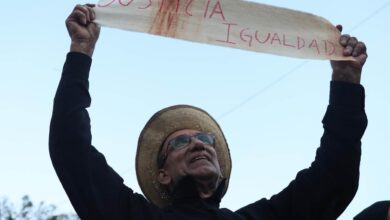HSBC’s Role in Latin America’s Environmental Crisis Unveiled

Paraguay’s Gran Chaco Forest hosts an incredible variety of life. However, trees in this area are being cut down, which leads to trouble. This threat is connected to global financial organizations. Concerns raised about HSBC draw attention to the battle between protecting nature and pursuing financial gain in Latin America.
Gran Chaco: A Wilderness Under Siege
The Gran Chaco Forest, often called “green hell” because of its rough landscape, covers nearly 250,000 square miles. It is the second-largest forest in South America after the Amazon. This vast land houses 3,400 plant species and 500 bird species. This place is an ecological treasure. It is very important for biodiversity and plays a key role in capturing carbon. Environmentalists like Sir David Attenborough have lauded the Gran Chaco as “one of the last great wilderness areas in the world.”
Despite its importance, the Gran Chaco faces relentless deforestation. Over the past three years, 75,000 hectares of forest—an area equivalent to New York City—have been destroyed, primarily to make way for cattle farming. Global Witness, a human rights organization, reports that Brazilian beef giant Minerva Foods has sourced beef from farms responsible for this deforestation.
Minerva Foods, a major player in the global beef market, operates extensively in Paraguay and relies on financing from international banks like HSBC. From 2021 to 2023, HSBC reportedly gave Minerva $210 million, which indirectly helped destroy the Gran Chaco. This financial connection has raised questions not only about HSBC’s dedication to sustainability but also about the role of financial analysts in evaluating and influencing such commitments. Their involvement in supporting businesses linked to harming the environment is a crucial aspect of this issue.
HSBC’s Climate Commitments in Question
HSBC’s new leaders face more intense scrutiny for their environmental actions. The bank states a very strict policy against deforestation and says it does not work with clients linked to deforestation. Global Witness disagrees with HSBC’s claim. They argue that the bank’s methods for checking facts are not good enough. Their processes seem inadequate.
“Yet again, our findings show that voluntary deforestation policies from banks like HSBC are completely inadequate,” said Alexandria Reid of Global Witness. Critics argue that while HSBC promotes its net-zero transition plan, its actions suggest a disconnect between policy and practice.
HSBC’s net-zero plan asks clients in cattle production to follow sustainable business rules. A bank spokesperson highlighted this promise: “HSBC really cares about deforestation impacts.” The bank says it checks clients in risky industries carefully. However, claims about Minerva’s work in Paraguay have increased criticism of HSBC’s care for the environment.
More issues arose when HSBC lowered the importance of its chief sustainability officer role. This decision raised doubts about its commitment to fighting climate change. Former chief sustainability officer Celine Herweijer’s departure has fueled speculation that the bank may be deprioritizing environmental initiatives under its restructuring plan led by CEO Georges Elhedery.
Global Financial Pressure and Regional Implications
The debate about HSBC’s environmental commitments highlights a more significant issue in global finance. The UK and EU want stricter environmental rules and net-zero targets. However, other places, especially in the Americas, do not want to focus on ecological problems. The potential impact of HSBC’s actions on the global finance industry, particularly in influencing the adoption of stricter environmental rules and net-zero targets, is a crucial aspect of this issue.
Big U.S. banks like JP Morgan face similar challenges. They have stepped back from climate change efforts after some states pushed back against environmental rules. This situation puts banks in a tricky spot. They need to balance between regions that care about the environment and ones that resist change.
Latin America faces very high stakes. Cutting down forests in the Gran Chaco and other places harms wildlife and fuels climate change. It also worsens economic and environmental problems there. Paraguay depends heavily on cattle farming to grow its economy. Stopping deforestation here means balancing saving nature with financial needs.
The UK Treasury’s suggestion of stricter rules on importing beef linked to illegal deforestation is a clear indication of the growing global effort to tackle these problems. However, the successful implementation of these policies requires not just individual action, but also collective effort. Banks, governments, and businesses must work together to effectively address the issue.
Sustainable Solutions for a Global Problem
In the middle of the controversy, Minerva Foods says its work follows Paraguay’s environmental rules. A company spokesperson said, “Minerva does all its work in Paraguay according to the current environmental laws.” However, following local rules only sometimes meets global sustainability standards.
Experts emphasize that sustainable cattle farming and tighter supply checks are not just necessary, but also feasible, to reduce deforestation. Banks like HSBC play a crucial role because their investment choices can significantly influence companies’ actions in sensitive areas.
Solving deforestation in the Gran Chaco and other places requires urgent and concerted action. Governments must enforce laws, businesses should use sustainable methods, and banks need to align investments with global climate goals. The Gran Chaco is shrinking, so taking action is urgent. This forest is a vital ecological resource and a symbol of the balance between environmental protection and economic growth. The urgency of the situation in the Gran Chaco is a crucial aspect of this issue that should engage the public and policymakers.
Also Read: Sheinbaum to Steer Mexico Through Economic and Environmental Crossroads
The situation in the Gran Chaco shows how global environmental and economic issues are connected. In Latin America, stopping deforestation is crucial for protecting natural heritage and achieving sustainable development. Banks, companies, and governments must work together to ensure economic progress does not destroy the planet’s last significant wilderness areas.





